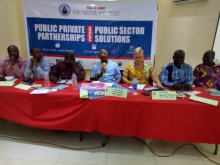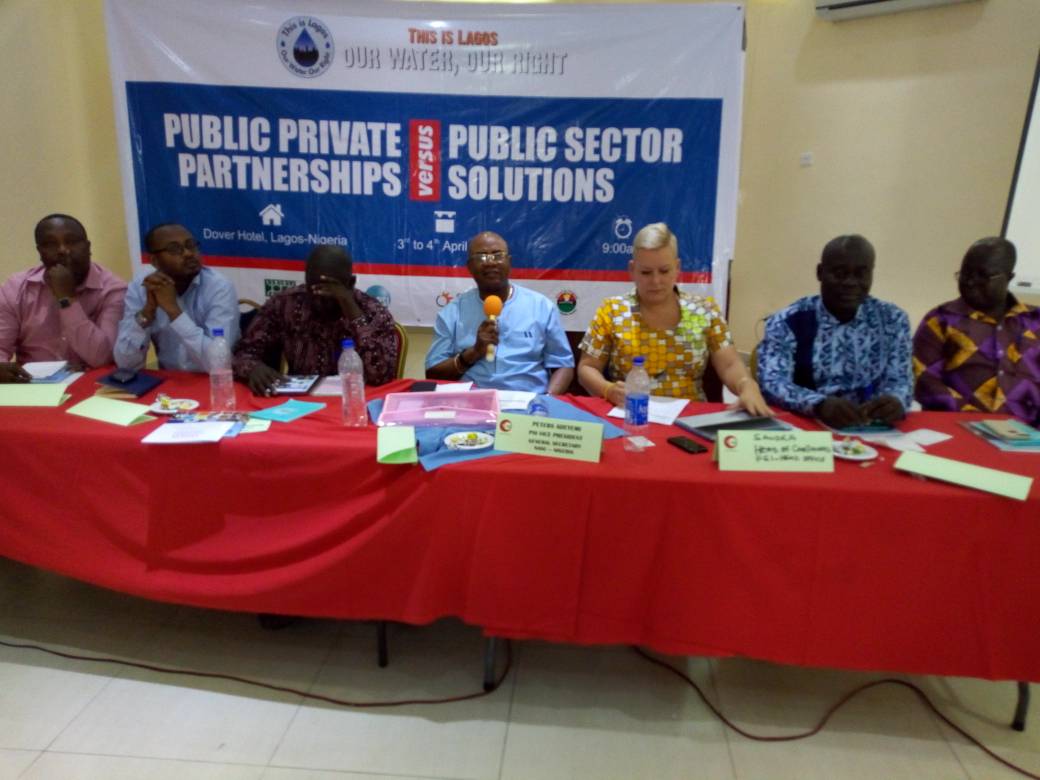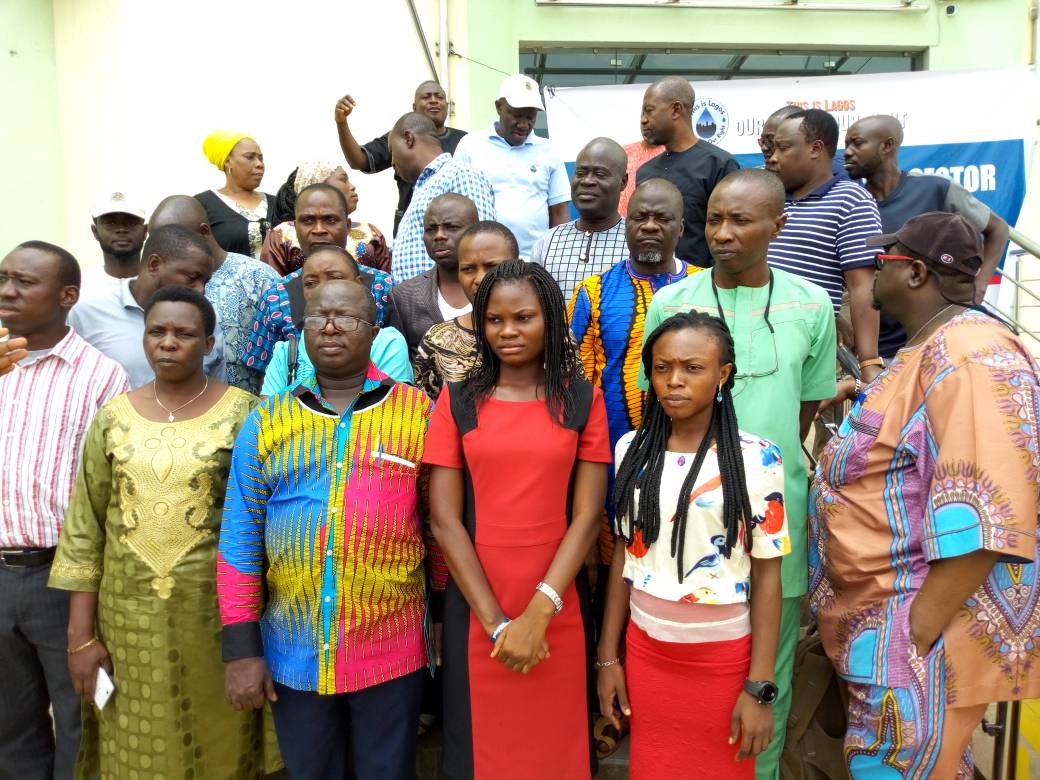PSI Warns Governments Against Privatization Attempts in Africa: “PPPs Only Another Face of Corruption"


by Etsey Atisu
The Federal Government of Nigeria, in the wake of growing campaigns against the privatization of water in Lagos State, and in extension, across Africa, has been cautioned against taking a decision that does not serve the general interest of the people.
PSI affiliates in Nigeria and Civil Society Organisations at a workshop in collaboration with the Environmental Rights Action and Friends of the Earth Nigeria (ERA/FoEN) in Lagos indicated that the government’s decision to privatize water is fraught with fundamental problems and not a solution in the citizen’s interest.
They agree that this new development by the State government encourages cronyism in the sale of state enterprises, lending credence to the fears that this new agreement could only be another face of corruption.
The workshop with representation from other African countries including Ghana, Kenya, Uganda, and Rwanda, where in each of these countries, various forms of privatization are either being enforced or are in the offing, was on the theme “Public Private Partnerships versus Public Sector Solutions.”
“Public Private Participation is not a panacea, rather governments should put more money in the public sector and ensure prudent and transparent management, while bringing culprits to justice,” said Sandra Vermuyten, PSI Head of Campaigns, representing PSI General Secretary, Rosa Pavanelli.
Vermuyten, who also spoke on PSI’s Campaign against Privatization of Public Services, 2030 Agenda and Current Global Policy Issues, said there is a growing global trend where public institutions are being sold to private investors, resulting in what she described as ‘corporate conquest or neo-colonialism’ which must be stopped.
“The people of Africa are not poor, but are only being ripped off by the moneybags in connivance with governments and global multinational.”
She submitted that the Nigerian government should imbibe public sector solutions in their agenda rather than the present privatization agenda of the World Bank and the International Monetary Fund (IMF), which are more profit-oriented than seeking the welfare of the people.
Other speakers also agreed that PPP is ill-conceived, ill-motivated and a bad choice with false experiments.
They added that the global perspectives of privatization shows that it has almost always failed, not only in African countries, but even in well developed countries where PPPs have been introduced.
“Either in education, water provision, health sector, electricity sector etc. available data has shown that PPP has failed and we must continue to amplify our voices against privatization, form more international alliances against it, and engage our communities more to ensure we resist it. We must ignore the tsunami of criticism against Public Sector Solutions and insist governments abandon this evil agenda” Akinbode Oluwafemi of ERA/FoEN explained.

[Left] Regional Secretary for Africa and Arab Countries, Sani Baba, with Everline Aketch, Sub-Regional Sec for English-Speaking Africa, with AUPCTRE, ERA leaders at a planning meeting; [right] some of the particpants at the workshop.
Following exhaustive deliberations and contributions, a communique, indicating further details on the workshop stated in parts that:
- There is a disturbing privatization tsunami sweeping across Africa;
- IFI’s and corporate powers are behind the aggressive promotion of privatization as an alleged panacea to mismanagement in the public sector in Africa;
- Twenty years of World Bank promotion of PPPs and other models of privatization have not yielded the much-touted success but instead left African countries with huge debts, infrastructural depletion and outright abdication of governmental responsibilities in terms of providing public services for their citizens;
- Land grabs by multinational corporations across Africa, including freshwater sources represents a new attack on common natural resources;
- Corruption contributes to granting of tax holidays, use of tax havens, and the creation of bogus projects that open gateways for more corruption;
- Synergy among labour unions, civil society, and other key players have lost traction considerably with dire consequences on people’s welfare;
- The majority of citizens have no knowledge of their rights and therefore fail to demand their implementation and enforcement, including unfettered access to safe and clean drinking water. Women, vulnerable groups and students are particularly at the receiving end of the lack of access to water and other basic needs that make life meaningful;
- Position of governments across Africa that assert that PPPs are a means of providing services to the people without tasking government finances is erroneous. In most cases the huge funding for PPP projects comes from government and little or nothing comes from the private sector;
- In fashioning solutions to public sector challenges governments across the continent have ignored critical voices of women, the youth and other critical voices in the society;
- Water privatization in Lagos will open the doors for privatization of water across the African region.
They also agreed that:
- African governments should reject privatization and anti-people models of intervention in the water and other sectors marketed by the World Bank and corporate powers under the privatization umbrella. Privatization under any guise, including PPPs, is not the solution to the poor performance of the public sector;
- Civil society, labour unions, students and grassroots groups need to build strong synergies and work together to halt the advance of privatization sweeping across the African continent;
- There is a need to link the governance issues at the domestic front and across Africa with the global campaigns against privatization and for tax justice;
- Re-municipalization is a global trend that offers opportunities to build local democratic governance of infrastructure and water resources;
- Involvement of civil society, faith-based organisations and people at the grassroots level, particularly Community Development Associations (CDAs) in awareness campaigns and actions to stop privatization in all forms. Communities must assert their ‘citizenship’ rather than accept ‘consumership’ through privatization;
- The Freedom of Information Act (FOIA) be explored and used as a tool to demand information on existing PPP projects;
- Probe of all funding for PPP projects across Africa, particularly in the water, energy, health and other sectors;
- Commencement of educating people at the grassroots on the dangers of PPP via mobile outreach;
- Involvement of the media in promotion of success stories in the fight against PPP in the water and other sectors across Africa to boost the morale of agitators for change. Also, promotion of further research in other countries on the African continent on the performance of PPPs as has been documented in Ghana, Kenya, Rwanda, Uganda and elsewhere;
- Creating a platform in tertiary institutions to educate students and involve them in the struggle against privatization of water and other sectors of the economy;
- Winning the campaign against water privatization in Lagos will send an unmistakable signal to the World Bank, corporate powers and other promoters of privatization;
- Contribute to PSI’s platform on PPPs/privatization – peopleoverprof.it.

Present at the workshop were, among others, PSI Vice President, Comrade Peters Adeyemi; Sandra Vermuyten, representing Rosa Pavanelli, PSI General Secretary; Sani Baba Mohammed, PSI Regional Secretary, Africa and Arab Countries; Everline Aketch, PSI Sub-Regional Secretary, English Speaking Africa; Baba Aye, PSI Health and Social Services Officer; Akinbode Oluwafemi, ERA/FoEN Deputy Executive Director; Comrade Benjamin Anthony, AUPCTRE National President; Boniface Kavuvi, Gen. Secretary KUCFAW, Kenya; Jordi Musoni Michel, National Chairman SYPECGAZ, Rwanda; Tom AMiti, General Secretary of UEAWU, Uganda; Richard Amparbeng, General Secretary, PSWU, Ghana; and Michael Nyantakyi, Gen Secretary PUWU-Ghana.
The rest were Comrade Biobelemoye Josiah, National President, MHWUN; Achike Chude, Joint Action Front; Philip Jakpor, Director, Media and Publicity, ERA/FoEN; Comrade S.O.Z. Ejiofor; Jaye Gaskia; Tunji Buhari, among others.

